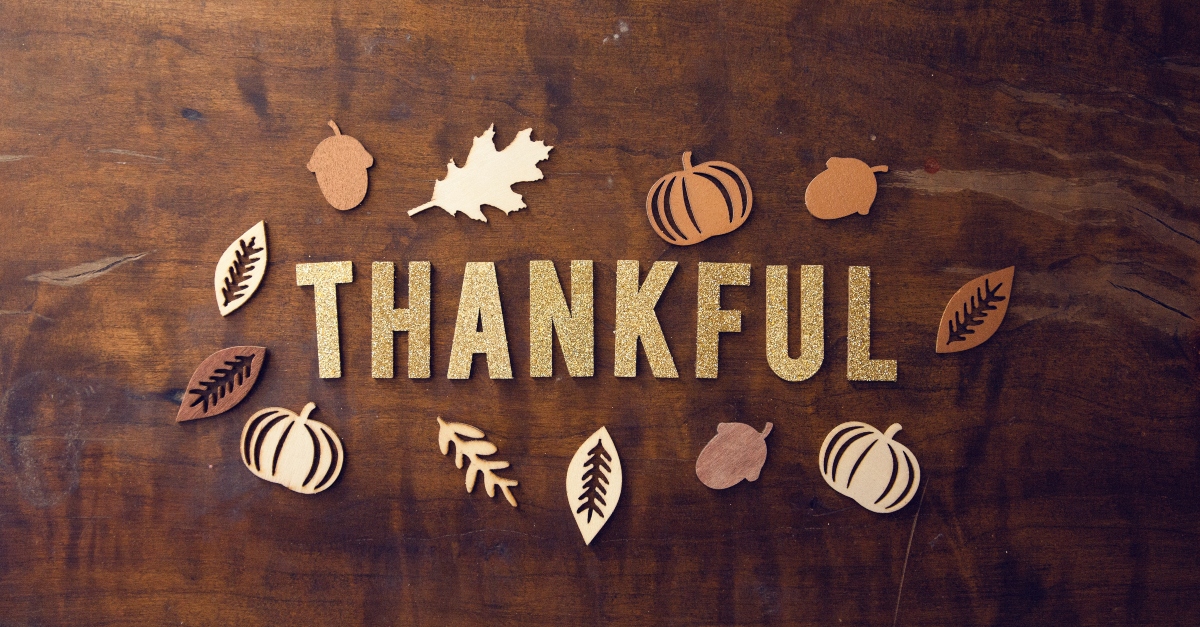Today, Look for More Opportunities to Be Grateful
Share

“It is good to give thanks unto the Lord, and to sing praises unto thy name, O Most High!” (Psalm 92:1).
Each year on the fourth Thursday of the month of November, we Americans participate in a national ritual of overeating called Thanksgiving. We cook for a week, eat dinner for hours, and have leftovers enough to pack up and send home with family and friends. It's a celebration of our “harvest,” a recognition of our blessings, and a demonstration of our love toward one another. While chronic overeating is a sin to be overcome, I believe our national recognition of God's goodness in our lives pleases Him – and this holiday is actually good for us!
Gratitude: It’s Good for You
Several research initiatives have been conducted in the last few decades, including “The Gratitude Project” (University of California) and “Project Gratitude” (Baptist Health Foundation). In one such study, researchers divided individuals into three groups. One group of participants practiced daily gratitude exercises (listing things for which they were grateful). They reported higher levels of alertness, enthusiasm, determination, optimism, and energy, and less depression and stress than the control group reported. And also not surprising, they reported being much happier than the group directed to keep a daily journal of all the bad things that happened to them.
Researchers determined that the practice of gratitude benefits the general population (regardless of religious faith or lack thereof), and that anyone can increase their sense of well-being and create positive social effects just from counting their blessings.
So, truly...it is good to give thanks to the Lord!
It's the Key to Personal Happiness
We usually think happiness is contingent on our circumstances. Certainly, circumstances play a part, but I'd argue 90% of whether we’re “contented people” has to do with our attitude towards our circumstances, rather than our circumstances themselves.
In fact, imagine this scenario: if you had a “Book of Job” moment. Suddenly you were told that you'd lost all your wealth in a stock market crash, lost all your family in a traffic accident, and lost your job in a corporate takeover. Your doctor then called with a devastating health report, and your mother-in-law showed up at the door with her luggage (and with the news she just ran over your dog in the driveway). You then received a call from the elders at your church in crisis over the resignation of your pastor, who announced that the Bible is a sham and there is no life after death. I imagine you'd be quite “unhappy.”
If then everyone shouted, “Gotcha! None of it is true!” I believe you'd take a deep breath, be angry for a moment, and then become exuberantly happy. But the fact is, you'd be in the EXACT same circumstances that you were in before, only your attitude changed.
John Henry Jowett, 19th century British pastor and author once commented, “Gratitude is a vaccine, an anti-toxin, and an antiseptic.” What did he mean by that? Gratitude is like a vaccine, and can prevent the invasion of a “disgruntled attitude” into our spirits. And like an anti-toxin, gratitude can prevent damage from the poison of cynicism, criticism and complaining. Like an antiseptic, a heart filled with gratitude can help soothe and heal even the deepest wounds we receive in life.
That’s why it is good to give thanks unto the Lord.
It's the Doorway to Peace
“Do not be anxious about anything, but in everything, by prayer and petition, with thanksgiving, present your requests to God. And the peace of God, which transcends all understanding, will guard your hearts and your minds in Christ Jesus” (Philippians 4:6-7).
Notice that between “do not be anxious” and receiving the “peace of God,” are prayers with thanksgiving. I believe it's sandwiched there for good reason – to show us that the way you move from the place of worry to the place of peace is through thanksgiving.
It’s a Defense against Spiritual Decline
A.W. Tozer is quoted as saying, “No man suddenly goes base.” In other words, a person does not walk intimately with God one day and then suddenly fall into the depths of sin the next. There is always a gradual erosion of moral values and a slow, spiritual slippage that takes place, possibly imperceptible to others. How does that happen?
“For although they knew God, they neither glorified Him as God nor gave thanks to Him, but their thinking became futile and their foolish hearts were darkened” (Romans 1:21).
That's how a spiritual decline usually begins – with ingratitude.

Photo credit: Unsplash/Olivia Snow
It Connects Us to Each Other and to Jesus
“As Jesus continued on toward Jerusalem, he reached the border between Galilee and Samaria. As he entered a village there, ten lepers stood at a distance, crying out, ‘Jesus, Master, have mercy on us!’ He looked at them and said, ‘Go show yourselves to the priests.’ And as they went, they were cleansed of their leprosy. One of them, when he saw that he was healed, came back to Jesus, shouting, ‘Praise God!’ He fell to the ground at Jesus’ feet, thanking him for what he had done. This man was a Samaritan. Jesus asked, ‘Didn’t I heal ten men? Where are the other nine? Has no one returned to give glory to God except this foreigner?’ And Jesus said to the man, ‘Stand up and go. Your faith has healed you’” (Luke 17:11-19).
It’s a short, but powerful story.
In Jesus’ day, leprosy and other skin diseases were cause for terrible fear and shame. Lepers were ostracized and could return to their community only if a priest examined them and declared them free of disease. Old Testament law held that an infected person must wear torn clothes, let his hair be unkempt, cover the lower part of his face and cry out, “Unclean! Unclean!” whenever other people were near.
As long as he had the infection, he remained “unclean.” He must live alone, outside the camp, away from his family and other people.
But one day when Jesus was on the border between Galilee and Samaria, instead of hearing the cry “unclean,” he heard another cry that went like this: “Master, have pity on us!”
Jesus’ heart was moved with compassion. In that cry, Jesus heard the pain in the hearts of these ten men stricken with leprosy. He heard not only their physical pain, but the emotional pain. He heard the pain of humiliation, loneliness and rejection. He heard and said, “Go show yourself to the priests.” So off they went in faith, faltering but hopeful.
And as they went along, the Scripture says they were cleansed of the infection of leprosy.
Can you see it? Ten men, outcasts shuffling along, moaning in pain from walking on damaged feet, people scattering before them, when one suddenly says, “My hands... look at my hands!!” And he sticks out a hand covered with pink, healthy skin. The next one says, “Same here! And I don't hurt anymore!” They all hug each other and fist bump, throw off the torn coats, unwrap the filthy bandages and sprint towards town, toward their waiting families and restored lives.
All but one.
All but the one who whirled around and ran in the other direction, back toward Jesus, falling at His feet, weeping with gratitude for his miracle.
Ten were rescued, cleansed, and given a brand-new beginning, yet only one ran toward his rescuer with a thankful heart. Only one connected with Christ, and his gratitude kept the bond strong.
“Jesus said to the man, ‘Stand up and go. Your faith has healed you.’”
It does the same for us. When we say “Thank You,” we are really saying to Him, “I realize that I’m nothing without You, that all I have and all I hope to be comes from Your gracious hand. I recognize that You are my source of strength, my source of hope, my source of provision, my source of power, my source of joy, my source of peace, my source of life!”
Thank you, Lord! The more you say it, the closer to God you feel.
Don’t take my word for it, try it. Try it every day when you wake. Try it as you go through the course of the day. Make it a habit for just a couple of days see if you don’t feel closer to God. It is good to give thanks unto the Lord.

Photo credit: Unsplash/Pro Church Media
Remembering What God Has Done
In the Old Testament times, the Israelites would remember what God had done for them by creating a visual rock memorial. Such a structure would remind them every time they saw it, and they would then tell their children about the deeds done by God on their behalf. The memorial would spur in them new gratitude for the blessings of God.
In the New Testament, one story in particular has always caught my interest. In Mark 2:1-12, Jesus heals the paralytic and instructs him to take up the mat he was laying on and go home. Why? Why keep such an object around, if not for a constant reminder of the mercy of God and miracle of healing he received?
Perhaps it's because we are chronically human, but we too need to be reminded to remain thankful for God's goodness in our lives. We become that one who comes to Jesus and remains connected to Him when we intentionally remember all He has done for us. Perhaps we should keep a few memorials, or mementos around as well.
When He heals your body, save the crutch, save the cast, save the wheelchair. When He heals your mind, save the bottle of pills. When He heals your marriage, save the broken plate. Or maybe it’s a journal, or a string around your finger. Whatever works for you, just be intentional about it and every now and again, go through your mementos and begin to thank God and sing praises!
Look for New Opportunities to Thank God
You can be thankful for almost anything. Trust me on this one, I speak from experience! Early on in my marriage I was struggling with the reality of a new baby on a part-time minister's salary. I was working a few additional odd jobs, but it still did not seem as if the ends would ever meet! One afternoon, I felt truly beaten down by it all and I cried out to God in my frustration. I'll never forget how He responded.
He instructed me to walk around our apartment and look closely at the things we had: the sofa, the spoons, the lamps, the pillows, the bedroom set. After each one, I felt Him say, Where did you get this? I had to respond, It was a gift. On and on, I went around the apartment, handling each item, feeling a surge of gratitude for the blessings of God, and the provision He had made for me and my family through the people He had placed around me. I experienced an attitude shift, and a recognition that God had my back. And even though my circumstances had not changed, gratitude moved me from feeling downcast to feeling blessed.
You too, can be thankful:
- If you own a Bible (1/3 of the world does not have access to the Word of God)
- If you can read your Bible (86% of the world's population is illiterate)
- If you have a roof over your head
- If you have $20 to your name
- If you ate today
... then you are blessed! Yes, you can be thankful for almost anything. It’s just a matter of your perspective, intentional remembrance, and looking for new opportunities to be grateful.
Related articles
10 Beautiful Worship Songs about Thanksgiving
How Does the Bible Encourage Us to Give Thanks, even in Hard Times?
6 Powerful Examples of Thanksgiving in the Bible
Photo credit: ©Getty Images/Prostock-Studio
